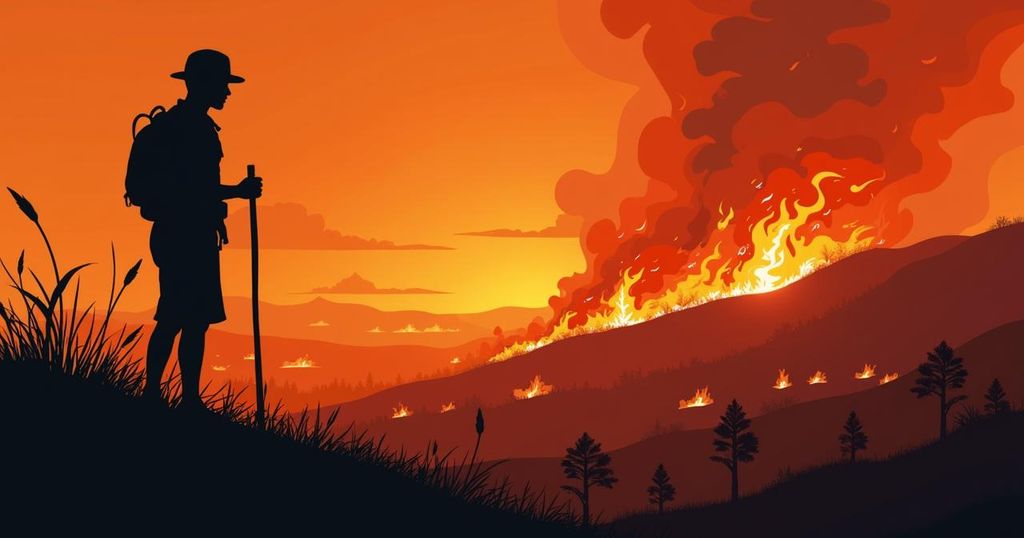Brazil’s Climate Crisis: Challenges and Opportunities for Environmental Leadership

Brazil is currently facing an environmental crisis characterized by unprecedented wildfires, severe drought, and flooding, with human-induced factors significantly exacerbating the situation. Despite some progress in climate discourse under the Lula administration, actions taken thus far do not reflect the scale of intervention required to address pressing climatic challenges. As Brazil prepares for international climate discussions, it must effectively align its ambitious targets with the realities of implementation to emerge as a credible leader in global climate action.
Amidst unprecedented environmental catastrophes, Brazil presently finds itself engulfed in a severe climate crisis. The nation is gripped by extreme heat, pervasive smoke, and ominous red sunsets, resulting from the widespread destruction of forests. Current data from the World Resources Institute’s Global Forest Watch reveals that Brazil is experiencing an unprecedented fire season, with fire alerts over 47,000 this year, marking the worst occurrence in a decade. In addition, the past year has witnessed an alarming 85% rise in areas impacted by fires compared to 2019 averages. This alarming trend is occurring simultaneously with severe flooding events, raising significant concerns over Brazil’s climate management. The human-induced nature of these fires sets Brazil apart from other fire-prone regions where fires occur as part of natural forest dynamics. A lack of regulatory oversight has led some agricultural producers to employ deforestation and burning to cultivate land. These fires are exacerbated by Brazil’s longest drought in 70 years, affecting over 80% of the country and resulting in catastrophic consequences, such as the lowest water levels recorded on the Madeira River in decades. Moreover, São Paulo, Brazil’s largest city, has recently reported the worst air quality globally, while healthcare systems face challenges due to respiratory illnesses linked to poor air quality. The agribusiness sector is also feeling the pressures of this environmental crisis, with fire-related damages in São Paulo estimated at R$2 billion (approximately $366 million). Concurrently, the various ecosystems, including the Cerrado, Pantanal, and Amazon, are suffering from ongoing threats that jeopardize their biodiversity and stability. Despite a noted drop in deforestation rates, experts warn that the Amazon could be on the brink of irreversible collapse within a few decades. As Brazil prepares to take a leadership role at the upcoming COP30 UN Climate Conference, there exists a critical juxtaposition of ambition and action. Under President Lula’s administration, the narrative surrounding climate change is shifting toward scientifically-informed dialogue and increased funding for fire management. However, discrepancies in governmental actions, including delays in appointing climate oversight organizations and pursuing oil exploration, have raised doubts regarding Brazil’s commitment to genuine climate action. Ultimately, the challenge remains: Can Brazil harmonize its development goals with effective decarbonization strategies? Brazil stands at a crossroads, needing to articulate ambitious greenhouse gas reduction targets and embrace comprehensive adaptation measures that enhance its resilience to climate change’s impacts. Failure to operationalize these commitments risks undermining its potential as a global environmental leader amidst escalating climatic extremes.
The current environmental and climatic challenges faced by Brazil stem from various intertwined issues of climate change and human activities, particularly deforestation and agricultural expansion through burning. The impacts of climate change have intensified, resulting in unbearable heat, severe droughts, and catastrophic wildfires, culminating in unfavorable air quality and public health crises. The situation is exacerbated by ineffective regulatory practices and insufficient governmental action, which threatens Brazil’s rich biodiversity and vital ecosystems, namely the Amazon Rainforest, Cerrado, and Pantanal. With Brazil gearing up as a prospective leader on the global climate stage, its handling of existing environmental crises will be scrutinized. The nation is expected to put forth ambitious climate policies ahead of significant international conferences but faces substantial internal challenges that may hinder progress.
In conclusion, Brazil is at a critical juncture concerning its climate policy and response strategies. The alarming escalations in wildfires and flooding necessitate an unwavering commitment to environmental stewardship. As the government strives to balance economic development with urgent climate action, it must also prioritize comprehensive policies that address all facets of the climate crisis. The path forward demands a cohesive approach to governance, robust investment in climate resilience, and a commitment to translating ambitious rhetoric into actionable results to safeguard both the environment and the wellbeing of its citizens going forward.
Original Source: thecityfix.com





